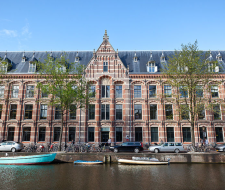6 best universities in Amsterdam 2026
- Advantages of Studying in Amsterdam
- Universities in Amsterdam: An Overview
- Higher Education in the Netherlands: The Binary System
- Research Universities
- Admission Requirements in the Netherlands
- Scholarships for Studying in the Netherlands
- Student Visas in the Netherlands
- Language of Instruction
- Literature and references
This content was developed and approved with active participation of Sam Jones.
In the process of preparing the material, we referenced the following sources:
- https://www.iamexpat.nl/education/education-news/6-dutch-universities-ranked-among-top-100-world
- https://universonline.nl/nieuws/2020/06/11/opnieuw-twee-nederlandse-universiteiten-top-100-qs-ranglijst/
-
 #15 in the Europe and #55 in the world
#15 in the Europe and #55 in the world NetherlandsAmsterdamCurrently watching: 9from 7300.00 € / term
NetherlandsAmsterdamCurrently watching: 9from 7300.00 € / term -
 INTERNSHIPS AT NIKE, GOOGLE AND MICROSOFT
INTERNSHIPS AT NIKE, GOOGLE AND MICROSOFT NetherlandsAmsterdamCurrently watching: 8from 8471.00 € / year
NetherlandsAmsterdamCurrently watching: 8from 8471.00 € / year -
 ranking is #39 in the Best Global Universities list
ranking is #39 in the Best Global Universities list NetherlandsAmsterdamCurrently watching: 5from 12500.00 € / year
NetherlandsAmsterdamCurrently watching: 5from 12500.00 € / year -
 from 8796.00 € / year
from 8796.00 € / year -
 from 14200.00 € / year
from 14200.00 € / year -

 NetherlandsAmsterdamCurrently watching: 3
NetherlandsAmsterdamCurrently watching: 3
-

-

-

-
 ranked 7th worldwide (first in Switzerland)
ranked 7th worldwide (first in Switzerland) SwitzerlandZürich
SwitzerlandZürich -

-
 #2 among U.S. national universities
#2 among U.S. national universities USABoston, Massachusetts
USABoston, Massachusetts -

-
 Top-50 best Marketing programs in the world
Top-50 best Marketing programs in the world SpainBarcelona
SpainBarcelona
Currently, Amsterdam's universities offer more than 1,000 programs instructed in English. The Netherlands pioneered English-language instruction in non-English-speaking countries. With widespread English proficiency and a vibrant international community, students in Amsterdam face no language obstacles.
Amsterdam's educational approach prioritizes student-centered, interactive learning. Students actively participate in discussions, workshops, presentations, classroom simulations, and independent research. Opportunities include academic internships, global exchange programs, advanced courses, and community engagement. These opportunities attract students from around the world, motivating them to enroll in Amsterdam's top universities.

What firstly should be considered when choosing a university?
It depends on the student - everyone determines the most important criteria for himself. I would advise you to take several rankings and compare them with each other, plus take into account the cost of the course, the location of the university and its scale, the percentage of graduates' employment. See where graduates continue their studies or where they go to work.
Alternative destinations
Advantages of Studying in Amsterdam
Studying in Amsterdam offers numerous benefits, making it an attractive destination for students worldwide. A few highlights include:
- Accessible Scholarships: The AUC Scholarship Fund supports 10-15% of enrolled students, easing the financial burden (auc.nl/scholarships).
- Two Major Research Universities: Students can choose to study at the University of Amsterdam or VU Amsterdam, enjoying full access to facilities, international networks, and student clubs.
- Global Network: Launch your career with a vibrant network of alumni living and working globally.
- City Life: Eastern Amsterdam, with its lively mix of cafes, local cuisine, and cultural diversity, becomes a home away from home.
- Guaranteed Housing: Enjoy the convenience of living with classmates in student dormitories throughout your three-year tenure.
- Personalized Education: Create your own study plan with individual guidance from mentors.
Universities in Amsterdam: An Overview
Dutch universities earn recognition in global higher education rankings, including Times Higher Education, QS, and the Academic Ranking of World Universities. Situated in the heart of Europe, Amsterdam provides a rich cultural experience. On-campus services like international advisors and social networks ensure that international students feel secure and integrated.
Higher Education in the Netherlands: The Binary System
The Dutch higher education landscape operates on a dual structure, differentiating between academic research-focused education (wetenschappelijk onderwijs) and practically-oriented professional higher education (hoger beroepsonderwijs). This division remained even after the introduction of the Bachelor-Master structure in 2002.
Types of Universities in Amsterdam
Amsterdam's higher education landscape features three main categories of institutions:
- Public Universities: These universities receive funding from the Ministry of Education, Culture, and Science, these universities grant officially recognized qualifications at government-regulated tuition costs.
- Accredited Universities: Although these institutions are not government-funded, they have the authority to confer legally recognized Bachelor's and Master's degrees, and they establish their own tuition costs.
- Private Universities: This group encompasses international institutions that function independently of Dutch governmental oversight but may seek accreditation from the Dutch-Flemish Accreditation Organization (NVAO) under certain conditions.
Research Universities
Universities focused on academic research generally offer a wide array of subjects, such as economics, law, medicine, languages and culture, natural sciences, and management. Furthermore, university colleges provide education oriented towards research, often connected to a research university, with a focus on Bachelor's programs in the humanities taught in English.
Universities of Applied Sciences
Higher vocational education (HBO) is mainly delivered by universities of applied sciences (hogescholen), which comprise seven sectors:
- Economics
- Healthcare
- Agriculture
- Education
- Social and public work
- Visual arts
- Technology
Some focus on distinct fields such as the arts, agricultural studies, or teacher training.
Programs at Amsterdam Universities
Bachelor's Programs: The first step in research-oriented higher education.
- Duration: 3 years (180 ECTS credits).
- Content: Generally, the first year concludes with a certificate; it mainly consists of theoretical education in a specialization or major/minor profile.
- A short thesis may be included in the third year.
- Degrees awarded: Bachelor of Arts (BA), Bachelor of Science (BSc), or Bachelor of Laws (LLB).
- The Bachelor’s degree (WO) is equivalent to level 6 of the Dutch Qualifications Framework (NLQF/EQF level 6).
Graduates from the Bachelor’s program may proceed to Master’s studies.
Master's Programs:
- Academic Master's programs are focused on the development of professional skills and in-depth study of specific disciplines.
- Research Master's programs involve scientific research aimed at improving analytical skills.
- Duration: Typically one year for academic master's programs; two years for research programs, teacher education, and courses in agriculture, science, mathematics, and engineering.
Ph.D. Programs:
Ph.D. programs in Amsterdam involve working closely with a supervisor during the research and dissertation process, usually completed within four years. The thesis defense takes place in public and is a formal procedure different from that in the UK. Admission requires a Master's degree or equivalent qualification and proof of medical coverage.
Tuition Fees in Amsterdam
- EU/EEA Students: Approximately €2,200 per year.
- Non-EU/EEA Students: Between €6,000 to €15,000 per year.
- Some institutions, like university colleges, may charge higher fees, which vary by institution.
Admission Requirements in the Netherlands
To enroll in Bachelor's programs at research universities, students must possess a VWO high school diploma. Those with a HAVO diploma can apply to universities of applied sciences. Certain programs, such as those in the field of arts education, might require additional qualifications. Some courses implement a numerus fixus, which limits the number of first-year students.
Scholarships for Studying in the Netherlands
- People holding a Dutch passport are eligible for government loans and can also obtain a complimentary student travel pass.
- The Dutch government provides tuition loans to students coming from the EU/EEZ, Switzerland, and Suriname.
- Beyond state funding, various universities offer scholarships to both EU/EEZ students and non-EU/EEZ students.
- Students have the opportunity to work part-time while studying, and university career services are available to assist in finding jobs. However, non-EU/EEZ students face work limitations, permitted to work only up to 16 hours per week.
Types of Scholarships
- Academic Scholarships: Awarded for academic excellence, which doesn’t always mean the highest grades but meeting a standard showing commitment to studies.
- Support Scholarships: Help with tuition fees or living costs, sometimes based on parental income.
- Sports and Creative Scholarships: For talented student-athletes, usually with specific performance standards and academic maintenance requirements.
- Immigration Scholarships: Offered to refugees and asylum seekers, enhancing higher education accessibility.
Student Visas in the Netherlands
- EU students do not require a visa for studying or working in Amsterdam.
- Non-EU students may need a visa, with the educational institution starting the visa process. Once the institution receives approval from the Dutch immigration service, students can apply for an entry visa (MVV) at a Dutch embassy or consulate.
Language of Instruction
- The official language of the Netherlands is Dutch, but there are also three other official languages and five recognized languages.
- Many academic degrees in Dutch institutions are offered in both Dutch and English. If you choose to study in a foreign language, you must provide proof of language proficiency (language certificate).
Studying in Amsterdam offers a blend of top-ranked education, multicultural exposure, and rich cultural experiences, making it a coveted destination for students across the globe.
5 best universities in Amsterdam 2026 rankings
| 1 | University of Amsterdam |
| 2 | Amsterdam University of Applied Sciences |
| 3 | Holland International Study Center |
| 4 | VU University Amsterdam |
| 5 | Global school for Entrepreneurship |
Top 14 best universities in Switzerland 2026
| 1 | Glion Institute of Higher Education Switzerland |
| 2 | Les Roches International School Montana |
| 3 | César Ritz Colleges Switzerland |
| 4 | IHTTI School of Hotel Management |
| 5 | Ecole Hoteliere de Lausanne |
| 6 | Geneva Business School |
| 7 | HIM Hotel Institute Montreux |
| 8 | Swiss Hotel Management School |
| 9 | Webster University Geneva |
| 10 | Business and Hotel Management School |
| 11 | Luzern IMI |
| 12 | Swiss Hotel Management School (SHMS) Caux |
| 13 | International University in Geneva |
| 14 | Culinary Arts Academy Switzerland |
Top 10 best universities in Netherlands 2026
Top 35 best universities and colleges in Canada 2026
| 1 | University of Toronto |
| 2 | McGill University |
| 3 | University of British Columbia |
| 4 | University of Alberta |
| 5 | Simon Fraser University |
| 6 | Montreal University |
| 7 | University of Windsor |
| 8 | York University |
| 9 | University of Guelph |
| 10 | McMaster University |
| 11 | University of Manitoba |
| 12 | University of Waterloo |
| 13 | Royal Roads University |
| 14 | Vancouver Film School |
| 15 | Kwantlen Polytechnic University |
| 16 | University of Calgary |
| 17 | Dalhousie University |
| 18 | Fanshawe College |
| 19 | University of Ottawa |
| 20 | Laval University |
| 21 | Sheridan College |
| 22 | University of Regina |
| 23 | Brock University |
| 24 | Thompson Rivers University |
| 25 | Humber College |
| 26 | Vancouver Island University |
| 27 | Mohawk College |
| 28 | Centennial College Toronto |
| 29 | Niagara College |
| 30 | Capilano University |
| 31 | Seneca College |
| 32 | Algoma University |
| 33 | Saint Clair College |
| 34 | Douglas College |
| 35 | LaSalle College |
Literature and references
-
6 Dutch universities ranked among the top 100 in the world
-
Nearly 123,000 international students in NL last year; 15% of total
-
Opnieuw twee Nederlandse universiteiten in top-100 QS-ranglijst
-
Universiteit van Amsterdam beter dan Universiteit Leiden op wereldranglijst
-
Drie Nederlandse universiteiten in top 100 van beste ter wereld
-
UT valt buiten top 250 in Times Higher Education-ranking
-
Universiteiten stijgen in nieuwe QS-ranking
-
TU Delft is hoogste Nederlandse universiteit op wereldranglijst
